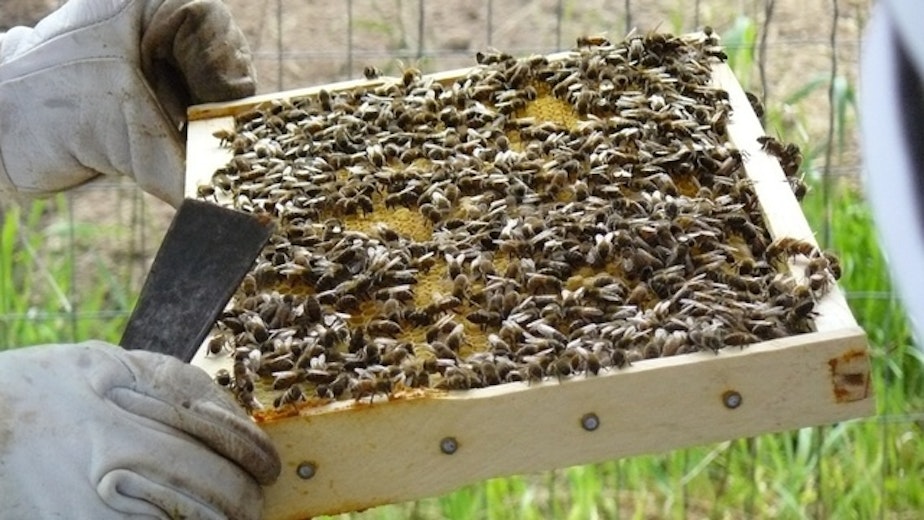A New Western Outlaw: The Bee Rustler

Warmer temperatures and blooming flowers are making it seem like we’ve finally turned the corner toward spring here in the Northwest.
And along with all of those blooming flowers will come a swarm of beekeepers from around the country. Most of them are headed toward the verdant fields and orchards of California.
Enter the bee rustler.
Much like cattle rustlers in the 19th century American West, these thieves profit from renting out stolen bees or selling the honey they make. Unlike in the Old West, however, our leading minds haven’t yet invented tiny bee brands.
The Capital Press makes the connection between a surge in Californian bee rustlers and dwindling bee populations as a result of colony collapse disorder.
Sponsored
Colony collapse disorder has been widely reported on since apiaries began noting major loses in 2006. The U.S. Department of Agriculture estimates beekeepers have been losing around a third of their colonies annually to CCD.
While the causes aren’t precisely known, researchers attribute CCD to stress on the bees caused by mites, some types of pesticides and viruses. It’s a costly problem considering honeybees contribute about $15 billion annually to agriculture, according to the USDA.
With that kind of money on the table, it’s not hard to see what compels some beekeepers to steal. And yes, many bee rustling cases seem to be perpetrated by other beekeepers. Taking a bee colony comes with more unique risks of bodily harm than other types of property theft — so it makes sense that only people who know what they are doing would attempt to steal a hive.
California’s beekeepers have lost thousands of dollars already to bee rustlers, but it doesn’t appear it’s an epidemic that’s spread to the Northwest just yet.
Officials at the Oregon and Washington state beekeepers associations say they haven’t seen major thefts yet. But that doesn’t mean they aren’t on their way.
Sponsored
“I would propose that this will become a ongoing problem,” said Mark Emrich, president of the Washington State Beekeepers Association.
Emrich says he’s seen cases of vandalism and a few small thefts occur in the past year. While the offenses haven’t been major so far, he expects more to come “with the costs of bees constantly climbing and bee losses continuing to mount.”
Oregon State Beekeepers Association President Paul Anderson hasn’t seen thefts either, but he notes it could be too early to say anything definitive.
“For this year, we wouldn’t know yet as the pollination activities in Oregon have just gotten started,” Anderson wrote in an email.
Even if the thefts aren’t in the Northwest yet, apiaries can take steps to protect bee colonies as theft becomes more prevalent.
Sponsored
Beekeepers can equip their colonies with GPS sensors that track in real time to locate stolen property. Motion sensors that trigger traps add an extra layer of security if the ultimate hive thief — Winnie the Pooh — wanders in looking for a sweet snack.
And for those that still can’t keep the thieves out? There’s always beekeeping insurance.
Read: Waypoints Blog's previous coverage of geothermal energy.
Copyright 2014 ERTHFX. To see more, visit earthfix.kuow.org.
